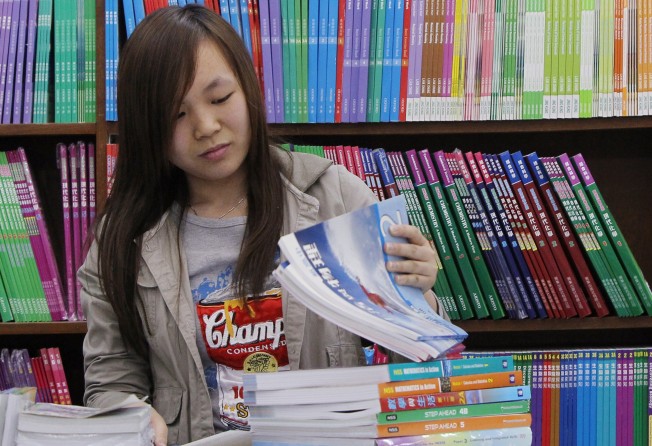Letters to the Editor, September 25, 2017

Textbooks are thrown away in wasteful city
Some recent correspondents have focused on book sharing in Hong Kong, or, to be more precise, the lack thereof.
A further example of this unfortunate (and wasteful) reality is the failure of our school system to ensure the sharing of textbooks and literary publications, from student to student, year on year.
This is a gross misuse of resources, a dreadful and unnecessary financial burden for parents, and a systemic failure to inculcate the values of sustainability, environmental awareness, recycling and the joy of sharing in our community.
As a teacher of many years experience in Hong Kong, I am appalled to see tens of thousands of books sent to the landfills every year, only to be replaced the following year.
Each student is required to purchase multiple texts, for and across multiple subjects.
Students might or might not scribble notes and/or answers into such textbooks, then trash them. This is a throwaway society indeed.
Back in the day, as a student, I would receive unmarked books via a school-based hand-me-down system of redistribution. Comments, notes and answers would be written into plain exercise books. Thus, each textbook would live on for many years. It was a win-win for all, except (of course) greedy publishers.
To counter any attempt at such sharing and environmental responsibility, publishers ensure cosmetic changes every now and then via second, third and fourth editions.
Doubtless, theirs will be a response of denial, citing, for example, the “need” to modernise content. But there may be a cultural barrier to the acceptance of second-hand goods as well. I’ll leave that notion for your other correspondents to confirm or deny. I believe such wanton wastage is an appalling use of resources and a terrible annual burden on parents.
It is yet another disincentive to have kids in our fine, materialistic city.
Barry Dalton, Sai Kung
Students need help with steep tuition fees
Young people and their families face a heavy financial burden, from primary school to tertiary education.
At school, they have to pay for so many textbooks and later on in life face high university tuition fees. And with inflation, these costs just keep going up.
Where families are on low incomes, undergraduates will apply for a student loan.
It can take them as long as 20 years to pay off these loans (which can be as high as HK$200,000) after graduation. This is an enormous financial burden to deal with before they have even found a job. And it is made worse when, as is seen in the case of first jobs, new graduates earn rather low salaries.
The government must offer more financial help, in the form of loans and subsidies, to help with these high tuition fees.
It must also offer loans so these young people can get a mortgage for their first home. As prices keep rising, it is very difficult for them to get on the property ladder.
Amber Lau Up-hay, Sheung Shui
Time to reform exam-oriented school system
Students at local schools are under a lot of stress, because the education system in our city is so exam-focused.
Too much importance is placed on exam results. This is made worse by the attitudes of some teachers, as well as parents who sign their children up for numerous tuition classes.
Students have to deal with a packed syllabus and a lot of homework. Those who are not going to excel academically, but show talent in other areas, are often neglected.
Youngsters go through school thinking that their exam results are more important than anything, especially the Diploma of Secondary Education (DSE) exam. Some will work late at night and lose sleep, which leaves them tired and stressed out the following day. They will also attend tutorial classes in the evening and at weekends when they should be relaxing.
These youngsters are not being equipped to become future pillars of society.
They are being indoctrinated to believe that nothing matters more than the DSE result.
Schools should be adopting a holistic approach to the overall schooling of our students. Their talents, whatever they may be, should be nurtured.
Many people have said that to make this happen, the government must reform the education system in Hong Kong.
If all stakeholders can work together to make the necessary changes, more young people in Hong Kong will be able to enjoy their school years.
Chan Yin-pui, Kowloon Tong
Concern over privacy issues in shared flats
I disagree with the Hong Kong Council of Social Service’s proposed Community Housing Movement (“Shared flat plan to offer relief for needy”, September 20).
It will have little impact on the city’s housing problems, with only 500 flats being made available for 1,000 poor households. Also, as families will be living in shared accommodation, I am concerned about privacy issues and tensions between tenants.
The government should be finding more land for public housing. Its strategy when it comes to land use has been inadequate.
Having more public estates should take priority over some of the administration’s infrastructure projects.
It needs to find long-term solutions, rather than back short-term measures such as this shared flats scheme.
Kong Lok-son, Tseung Kwan O